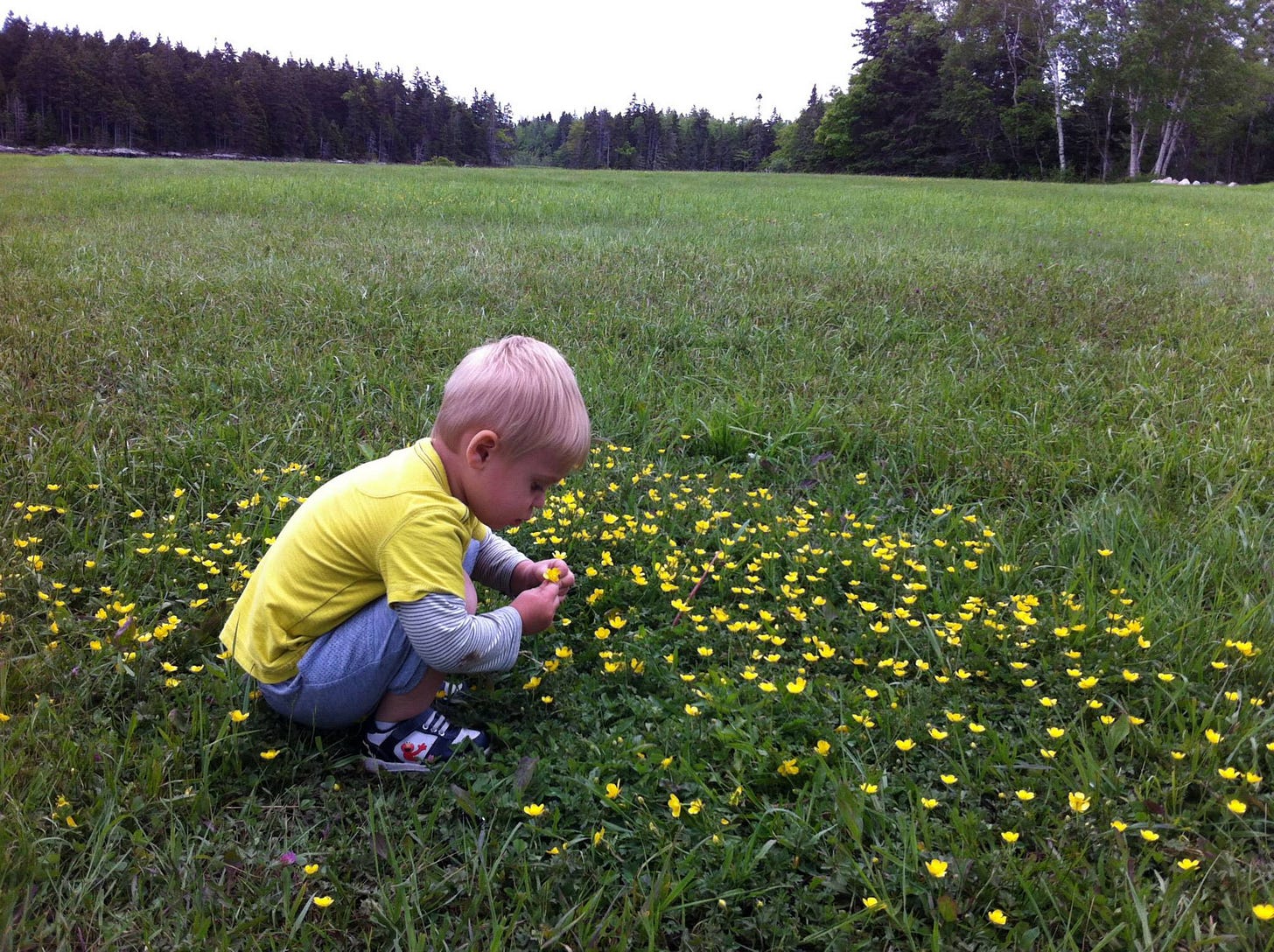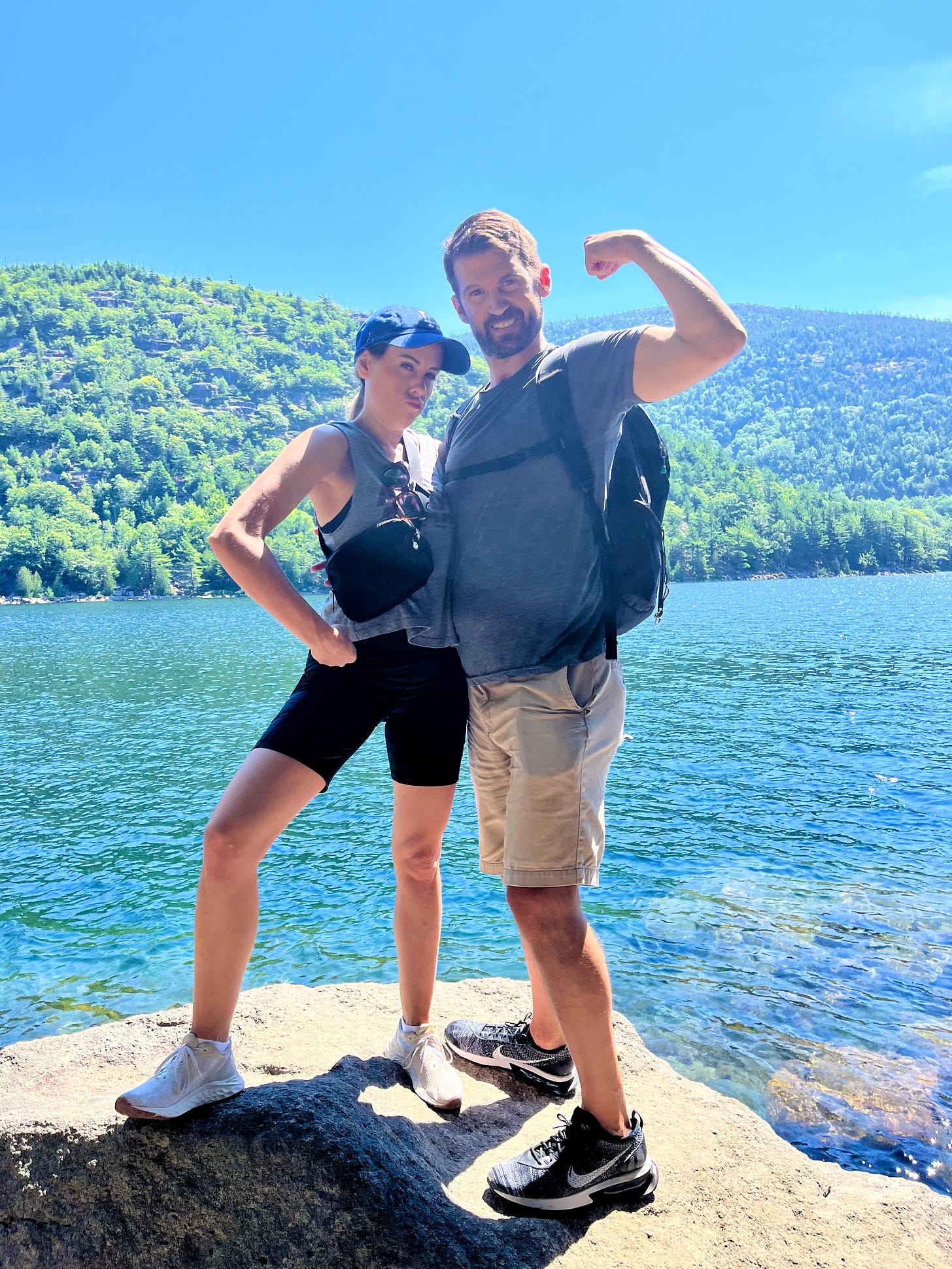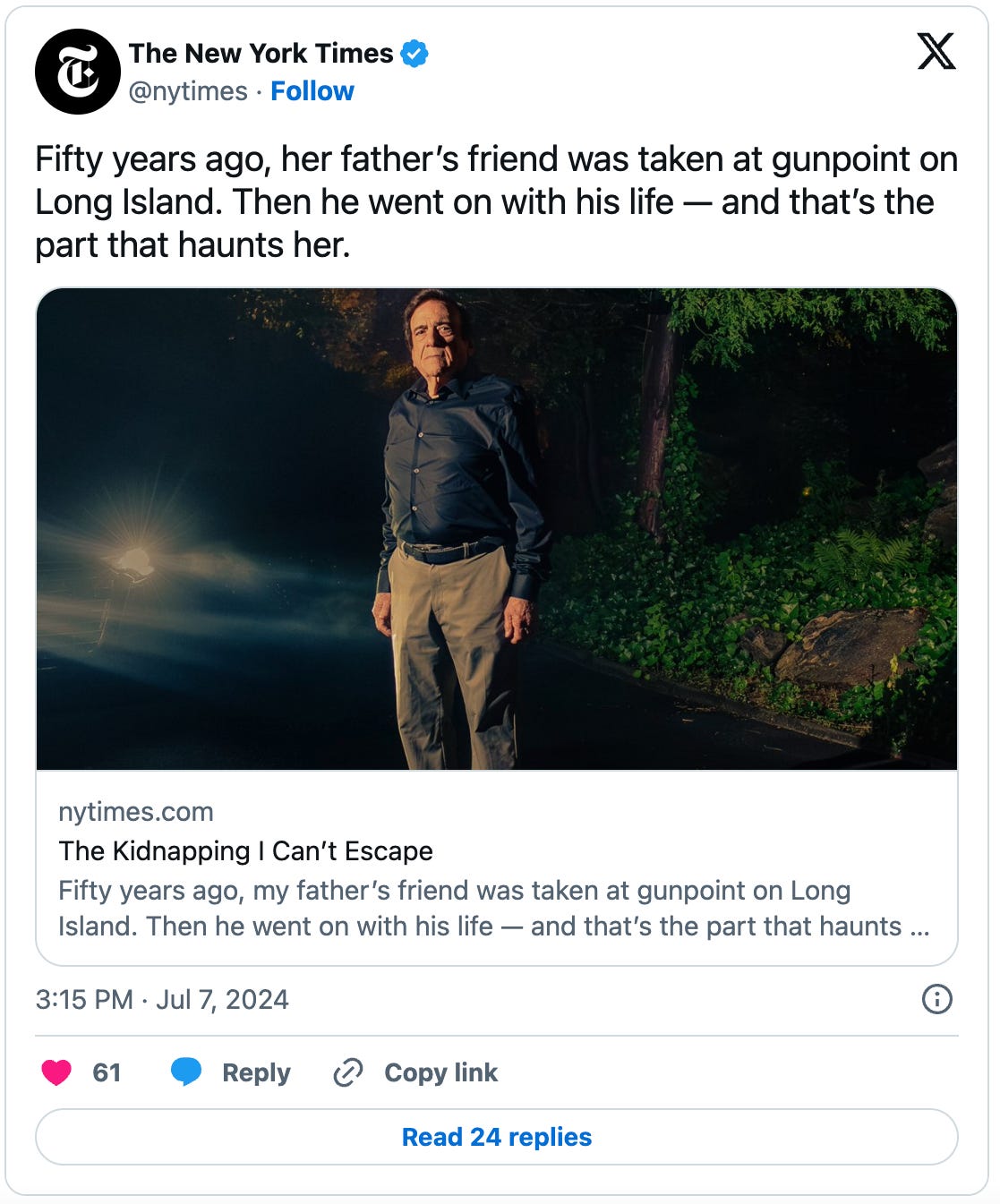Leave the World Behind (But Not Our Stories)
Reflecting on the distance we've traveled and learning to make room for the luggage we can't put down
About nine months ago, my husband looked at me and asked, “What do you want to do next summer?”
It’s taken me years to learn that a place is best enjoyed with a well-matched travel buddy, and for that reason, not every place in the world is the right place for a family trip. As much as I dig long airplane rides, new languages, and fast-paced activities, they’re hard on my husband’s already taxed brain, and they can be even more stressful when children are along for the ride.
Sometimes we’re in the mood to contend with all that. But sometimes we just want to throw our duffel bags and 60 lb island dog in the car and go someplace where we still have access to our favorite creature comforts. This summer we’ve found that place in Maine, in a small lake town 45 minutes outside Acadia National Park.
For those who don’t know, we have a bit of a pre-existing relationship with this place.
Eleven years ago, we embarked on a 1,100-mile road trip from Southern Maryland to Halifax, Nova Scotia, where my husband received weeks of intensive speech therapy to work on his aphasia. At the time, there were only three such programs available in North America, so, for us, it was Halifax or bust, and basically our best and only chance at getting back what brain injury had taken from us.
Given TC’s new disabilities, I was the sole driver and hellbent on making it the epic road trip of my dreams (lemonade out of lemons and all that). A family friend had advised about some delicious hummus to be found in a small town called Southwest Harbor, so I penciled it into our itinerary and off we went, chasing tahini and chickpeas along the beautiful Maine coast.
We only stayed in Southwest Harbor for a night, so though we were Acadia proximate, we never got to explore the national park, let alone hike any of its magnificent trails. It was a shame, one I filed away in a deep filing cabinet of grievances from the time. Who knew? Maybe we’d be back one day. Maybe the time was not yet right for us and the great pine tree state.
“Anywhere cooler than here,” was my response to TC’s question last fall, Maine being the logical counter destination to DC’s humid summers (though, truthfully, it’s warm up north, too). Without much further thought, we booked a small cabin on a lake for July and started dreaming up #lakelife fantasies of morning cold plunges, long kayaking trips, and an abundance of downtime for reading, board games, classic movies, and maybe, hopefully (fingers crossed), even a bit of writing.
Thus far the journey has been everything we’ve hoped for, but most importantly, it’s been a reminder of how far we’ve traveled to arrive here. As someone who is generally hard on myself (the challenge of living up to my own expectations keeps me in a perpetual state of hustle), I don’t tend to pat myself on the back, nor immerse myself in difficult, bygone events. I’m far more interested in forward motion - learning something new and becoming something new along the way.
But reflecting is a form of learning. And there is value in giving ourselves credit where credit is due.
A few years ago, my sister read something that flipped her thinking about motivation. “Instead of beating yourself up for what you haven’t done yet, have you considered naming the things you have done?”
Her words gave me pause. Wait. Wasn’t that cheating? Wasn’t I more likely to achieve my next goal by riding myself mercilessly and comparing myself to everyone more successful?
No, the research suggests. In fact, we’re far likelier to manifest the trajectory of our dreams by periodically giving ourselves credit for what’s in the rearview mirror.
When I think back to that road trip eleven years ago, my desperation at helping TC regain his language, my best friend sitting beside me but unable to connect, the utter loneliness on those dauntingly long, northern roads, it’s with equal amounts of awe and disbelief. I did that, I’m forced to acknowledge. Not only did I survive those impossible moments, I found ways to thrive. It’s the evidence to support this reminder: Not only are we equipped for what’s ahead, we have proven track records to suggest we’ll thrive in the face of new challenges.
What a comfort.
Trauma, of course, doesn’t go away. We don’t just heal from it and move on. But we do find a way to mold our lives around it, to incorporate it into the next versions of who we become. I was reminded of that fact while reading Taffy Brodesser-Akner’s moving piece, The Kidnapping I Can’t Escape, in which she examines the unusual kidnapping experience of Jack Teich, a childhood acquaintance (and a story that loosely inspired her new novel, Long Island Compromise), to better understand her own traumatic experience.
I understood the author’s fascination with Jack’s story. More than that, I could relate. When we’re struggling in life, we can’t help but turn our gaze outward, desperate to identify folks whose lives can serve as a roadmap for our own. After all, if someone else identified a way forward, so can we.
For years, Brodesser-Akner operated from the assumption that Jack was fully healed and at peace with the traumatic multi-day ordeal that nearly ended his life. After all, there was his later success in business and his positive attitude to point to as evidence. But when she pulled back the veil, another truth revealed itself: that Jack had engineered his life around his trauma. The sense of safety stolen from him on the night of his kidnapping informed everything about the way he carried himself through the world.
And so it goes. For Taffy Brodesser-Akner. For Jack Teich. For me and TC. And for us all.
We heal but we don’t forget. We find success but maybe not safety. We achieve happiness but our bodies remember.
For those who have survived trauma, perhaps it’s most comforting, most impressive, to recognize that we arrive someplace new not by ridding ourselves of our hard stories, but by learning to shoulder them, by making them our most essential luggage.
It’s taken us a long time to return to Maine on our own terms, but as we’ve learned, there are no shortcuts on this journey.
Your (Optional) Homework:
Make a list of at least 5 accomplishments from the last 5 years.
Think outside the box to diversify your list. Some may be career accomplishments, others may be personal. For example, helping your child navigate a tough year of school. Any example of showing up to something hard is an accomplishment. Can you keep your pen moving for at least 3 minutes?






"We heal but we don't forget." Those are such important words. Thanks, Abby, for another beautiful and inspiring piece.
Love this, Abby ❤️